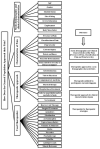How does the general population approach their pain? A cross-sectional study in Palestine
- PMID: 38268944
- PMCID: PMC10807350
- DOI: 10.1177/20503121231223442
How does the general population approach their pain? A cross-sectional study in Palestine
Abstract
Background: Pain perception and management vary across cultural contexts; yet, little is known about pain approaches in the general population of Palestine. Existing research lacks specific knowledge about how pain is coped with in this region.
Objective: To explore pain management among Palestine's general population, studying prevalence, characteristics, and sociodemographic influences. It aims to uncover treatment choices and understand cultural impacts on pain experiences, offering insights into Palestinian pain perception and coping strategies.
Methods: Convenience and snowball sampling methods were employed to collect data from 646 adults in Palestine. Participants' sociodemographic characteristics, pain experiences, and pain management strategies were examined. Descriptive statistics, chi-square tests, and binary logistic regression followed by multiple logistic regressions were used for data analysis.
Results: A significant portion of participants reported experiencing pain, with chronic pain being predominant. Pain prevalence varied across age groups, with higher rates in the elderly, followed by middle-aged and younger participants. Marital status and education level were linked to pain prevalence. Participants employed diverse pain management strategies, such as self-medication, physician visits, complementary medicine, and physical therapy. Age, gender, marital status, and education level influenced choices in pain management approaches. For instance, the elderly favored traditional medical interventions, while higher education levels were associated with reduced inclination toward conventional treatments.
Conclusion: This study underscores the complex interaction of sociodemographic factors, pain experiences, and treatment preferences in pain management. It emphasizes personalized strategies considering age, marital status, education, and gender. Integrating these aspects improves treatment and satisfaction. The findings empower healthcare providers to create precise strategies, enhancing patient experiences for better outcomes.
Keywords: Pain perception; alternative medicines; coping strategies; prevalence; self-medication.
© The Author(s) 2024.
Conflict of interest statement
The author(s) declared no potential conflicts of interest with respect to the research, authorship, and/or publication of this article.
Figures
Similar articles
-
A meta-ethnography of how children and young people with chronic non-cancer pain and their families experience and understand their condition, pain services, and treatments.Cochrane Database Syst Rev. 2023 Oct 5;10(10):CD014873. doi: 10.1002/14651858.CD014873.pub2. Cochrane Database Syst Rev. 2023. PMID: 37795766 Free PMC article. Review.
-
Palliative care experiences of adult cancer patients from ethnocultural groups: a qualitative systematic review protocol.JBI Database System Rev Implement Rep. 2015 Jan;13(1):99-111. doi: 10.11124/jbisrir-2015-1809. JBI Database System Rev Implement Rep. 2015. PMID: 26447011
-
Self-Medication with Modern and Complementary Alternative Medicines in Patients with Chronic Pain.J Res Pharm Pract. 2022 Aug 18;11(1):19-24. doi: 10.4103/jrpp.jrpp_14_22. eCollection 2022 Jan-Mar. J Res Pharm Pract. 2022. PMID: 36277968 Free PMC article.
-
Exploring factors associated with pain in hemodialysis patients: a multicenter cross-sectional study from Palestine.BMC Nephrol. 2021 Mar 17;22(1):96. doi: 10.1186/s12882-021-02305-1. BMC Nephrol. 2021. PMID: 33731036 Free PMC article.
-
Psychological interventions for people with hemophilia.Cochrane Database Syst Rev. 2020 Mar 18;3(3):CD010215. doi: 10.1002/14651858.CD010215.pub2. Cochrane Database Syst Rev. 2020. PMID: 32187661 Free PMC article.
Cited by
-
Telerobotic Intergroup Contact: Acceptance and Preferences in Israel and Palestine.Behav Sci (Basel). 2024 Sep 23;14(9):854. doi: 10.3390/bs14090854. Behav Sci (Basel). 2024. PMID: 39336069 Free PMC article.
-
Pharmacogenetic landscape of pain management variants among Mediterranean populations.Front Pharmacol. 2024 May 15;15:1380613. doi: 10.3389/fphar.2024.1380613. eCollection 2024. Front Pharmacol. 2024. PMID: 38813106 Free PMC article.
-
Experiences of pain among Palestinian advanced cancer patients: a socio-cultural reading of reports from the Israeli occupied West Bank.Front Psychiatry. 2025 Apr 23;16:1536839. doi: 10.3389/fpsyt.2025.1536839. eCollection 2025. Front Psychiatry. 2025. PMID: 40336704 Free PMC article.
References
-
- Riad M, Reyala A. Nursing students’ knowledge and attitude toward pain management in Gaza Strip, Palestine. J Clin Anesth Pain Manag Open Access 2020; 4: 101–106.
-
- Health conditions in the occupied Palestinian territory, including east Jerusalem, and in the occupied Syrian Golan, https://apps.who.int/iris/handle/10665/2399 (2023, accessed 14 August 2023).
LinkOut - more resources
Full Text Sources



